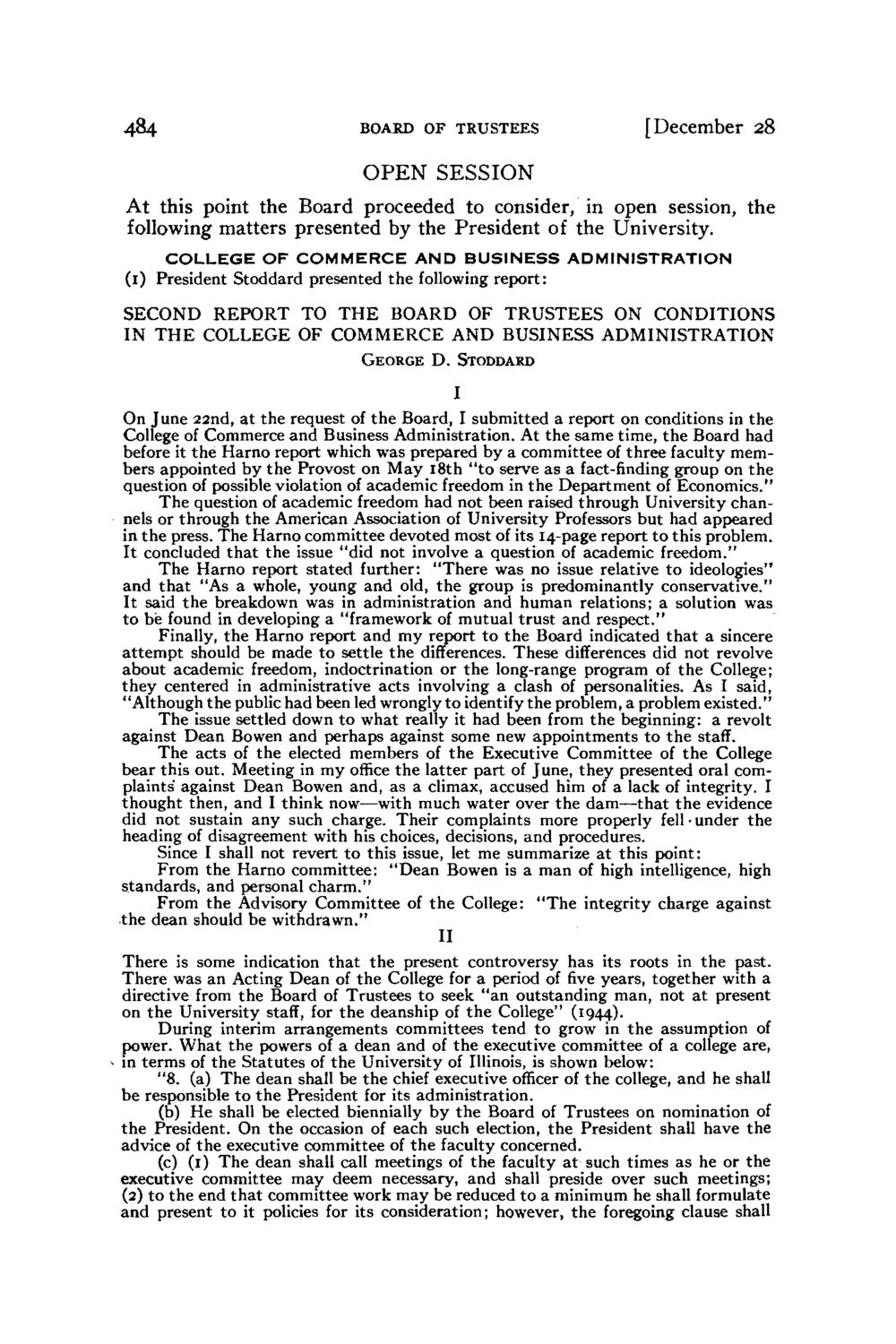| |
| |
Caption: Board of Trustees Minutes - 1952
This is a reduced-resolution page image for fast online browsing.

EXTRACTED TEXT FROM PAGE:
484 BOARD OF TRUSTEES [December 28 O P E N SESSION At this point the Board proceeded to consider, in open session, the following matters presented by the President of the University. COLLEGE OF COMMERCE A N D BUSINESS ADMINISTRATION (1) President Stoddard presented the following report: S E C O N D R E P O R T TO T H E BOARD OF T R U S T E E S ON C O N D I T I O N S I N T H E COLLEGE OF C O M M E R C E A N D BUSINESS A D M I N I S T R A T I O N G E O R G E D. STODDARD I On June 22nd, at the request of the Board, I submitted a report on conditions in the College of Commerce and Business Administration. At the same time, the Board had before it the Harno report which was prepared by a committee of three faculty members appointed by the Provost on M a y 18th " t o serve as a fact-finding group on the question of possible violation of academic freedom in the Department of Economics." The question of academic freedom had not been raised through University channels or through the American Association of University Professors but had appeared in the press. The Harno committee devoted most of its 14-page report to this problem. It concluded that the issue "did not involve a question of academic freedom." The Harno report stated further: "There was no issue relative to ideologies" and that "As a whole, young and old, the group is predominantly conservative." It said the breakdown was in administration and human relations; a solution was to be found in developing a "framework of mutual trust and respect." Finally, the Harno report and my report to the Board indicated that a sincere attempt should be made to settle the differences. These differences did not revolve about academic freedom, indoctrination or the long-range program of the College; they centered in administrative acts involving a clash of personalities. As I said, "Although the public had been led wrongly to identify the problem, a problem existed." The issue settled down to what really it had been from the beginning: a revolt against Dean Bowen and perhaps against some new appointments to t h e staff. The acts of the elected members of the Executive Committee of the College bear this out. Meeting in my office the latter part of June, they presented oral complaints' against Dean Bowen and, as a climax, accused him of a lack of integrity. I thought then, and I think now—with much water over the dam—that t h e evidence did not sustain any such charge. Their complaints more properly fell • under the heading of disagreement with his choices, decisions, and procedures. Since I shall not revert to this issue, let me summarize at this point: From the Harno committee: "Dean Bowen is a man of high intelligence, high standards, and personal charm." From the Advisory Committee of t h e College: " T h e integrity charge against t h e dean should be withdrawn." II There is some indication that the present controversy has its roots in the past. There was an Acting Dean of the College for a period of five years, together with a directive from the Board of Trustees to seek "an outstanding man, not at present on the University staff, for the deanship of t h e College" (1944). During interim arrangements committees tend to grow in t h e assumption of power. What the powers of a dean and of the executive committee of a college are, in terms of the Statutes of the University of Illinois, is shown below: " 8 . (a) The dean shall be the chief executive officer of the college, and he shall be responsible to t h e President for its administration. (b) He shall be elected biennially by the Board of Trustees on nomination of the President. On the occasion of each such election, the President shall have the advice of the executive committee of the faculty concerned. (c) (1) The dean shall call meetings of the faculty at such times as he or the executive committee may deem necessary, and shall preside over such meetings; (2) to the end that committee work may be reduced to a minimum he shall formulate and present to it policies for its consideration; however, the foregoing clause shall
| |